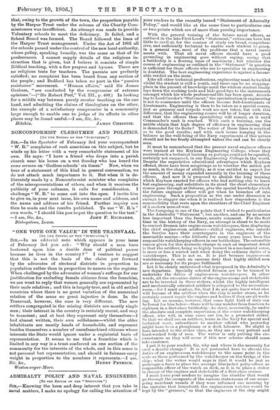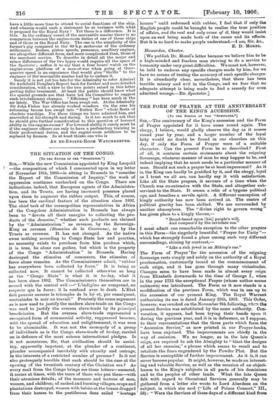ADMIRALTY POLICY AND NAVAL ENGINEERS. [TO THE EDITOR OW TILE
"SPECTATOR."] S,—Snowing the keen and deep interest that you take in naval matters, I make no apology for calling the attention of
your readers to the recently issued " Statement of Admiralty Policy," and would like at the same time to particularise one or two points which are of more than passing importance.
With the general training of the future naval officers, as outlined in the late First Lord's " Statement," critics can have but little to cavil at, for the courses of study are broad, comprehen- sive, and sufficiently technical to enable each student to grasp, in a general way, most of the problems that a naval career meets with. That all naval officers should have a good grounding in engineering goes without saying, seeing that a battleship is a floating mass of machinery ; but whether the course of engineering as outlined in the " Statement" in question is sufficient for those officers who are to specialise in engineering is doubtful. The best engineering experience is against a favour- able verdict on the issue.
Like all other technical professions, engineering must be tackled whilst the student is still a youth, and there can be no stopping- place in the pursuit of knowledge until the whilom student finally lays down the working tools and bids good-bye to the instruments amongst which his whole professional life has been spent. Accord- ing to Lord Cawdor's "Statement," the specialisation in engineering is not to commence until the officers become Sub-Lieutenants or Lieutenants. Engineering is then to be taken as a special course, just as gunnery and torpedo work are now taken, but with this difference, that the engineering course will be of longer duration, and that the officers thus specialising will remain at it until Commander's rank is reached. With such a training, can the nation obtain that high degree of efficiency in engineering that is demanded for its fleets ? The writer of these lines is sceptical as to the good results; and with such issues hanging in the balance as the well-being of the Navy experiments of this nature should not be too freely attempted unless the end can be clearly seen.
It must be remembered that the present naval engineer officers were trained at the Keyham Engineering College, where they received such a technical training as perhaps could not be equalled, certainly not surpassed, in any Engineering College in the world. Despite the superlative educational advantages which Keyhauf offered, there have been misgivings as to whether the nation got as much, in the shape of ability, as it was entitled to expect for the amount of money expended annually in the training of these officers. And now it is proposed to abolish the long training which Keyham exacted for officers who had nothing else to learn but engineering, and substitute in its stead the short elementary course gone through at Osborne, plus the special knowledge which the future engineer officer will get when ho branches off into, engineering. Such a proposition as the one under discussion is enough to stagger one when it is realised how stupendous is the responsibility that rests upon the shoulders of the Chief Engineer of a modern man-of-war.
The foregoing is one of the points that I wished to particularise in the Admiralty "Statement"; but another, and one by no means less important than the former, awaits comment. For the first time in the history of the Navy, an attempt is about to be made to convert firemen into engine-room watch keepers, thus displacing the chief engine-room artificers—skilled engineers, who outside the Service have their counterparts in the engineers of the mercantile marine—who hitherto for many years have been the responsible watchkeeping officers in our battleships. The ostensible reason given for this dramatic change in such an important detail is that the artificer, being so highly trained in a mechanical sense, is more or less a wasted unit when doing the ordinary duties of a watchkeeper. This is not so. It is just because engine-room watchkeeping is such an onerous duty that highly skilled men are so necessary for its proper fulfilment.
Let it be clearly understood what is proposed in the Admiralty's new departure. Specially selected firemen are to be trained to undertake the duties of engine-room watchkeepers. In other words, all the executive duties of the engine-rooms and stokeliolds are to be invested in these stokers, whilst the highly intelligent and mechanically educated artificer is relegated to the recreation- room,—for I must confess, Sir, that I do not quite know what else will become of the artificer when the snip is under steam, as ho certainly cannot repair the engines and boilers if they are all work- ing. Let us assume, however, that some light kind of duty can be found for him below—there will be any number from fourteen to eighteen in a first-class battleship—he must, necessarily, be under the absolute and complete supervision of the senior watchkeeping officer, who will, in nine cases out ten, be a promoted stoker. So that we shall see an artificer, borne in the Navy for special and technical work, subordinate to another official who yesterday might have been a ploughman or a dock labourer. No slight is here intended to the stoker class, as they are a very patient and hard-worked body of men. The writer is only putting the cir- cumstances as they will occur if this new scheme should come into existence.
I put it to your reader's, Sir, why and where is the necessity for such a drastic change ? It is not pretended here to elevate the duties of an engine-room watchkeeper to the same point in the scale as those performed by the watchkeeper on the bridge of the ship ; what the writer would urge is that it would be just as grotesque a farce to place the average bluejacket petty-officer as responsible officer of the watch on deck, as it is to place a stoker in charge of the engines and stokeholds of a first-class cruiser.
I must leave your readers to imagine the shudder that would go through the occupants of the various state-rooms of our ocean- going merchant vessels if they were informed one morning by the captains that henceforth the engine-room watches would be kept by the "greasers," so that the engineers of the ship might
have a little more time to attend to social functions of the ship. And wherein would such a statement be at variance with what is proposed for the Royal Navy ? Yet there is a difference. It is this. In the ordinary vessel of the mercantile marine there is no comparison between the engine-room duties of one of these ships and of those in the Royal Navy. The one is the simplicity of the farmer's gig compared to the 60 h.p. motor-car of the ordinary millionaire. Boilers, piston speeds, pressures, auxiliary engines, are altogether different from, and more complicated than, those of the merchant service. To describe in detail all the major and minor differences of the two types would require n11 the space of the Spectator; suffice it to say that a four hours' watch on the engine-room platform of a man-of-war when going at three- quarter speed is an experience that would give "thrills" to the engineer of the mercantile marine had he to endure it.
Surely it is not yet too late for the Admiralty to refer Admiral Sir Archibald Douglas's Report back for further and more detailed consideration, with a view to the two points raised in this letter getting fuller treatment. At least the public should know what the special grounds are that have led his Committee to suggest such revolutionary changes. " Efficiency " has been much in the air lately. The War Office has been swept out. At the Admiralty Sir John Fisher has already worked wonders. On the seas his reforming broom has swept into "Rotten Row" whole fleets of obsolete warships. For these things we have admired him, and marvelled at his strength and daring. Is it too much to ask that he should give further consideration to this question of lowered ability in the engine-rooms ? For lowered ability it surely must be if the engineer officers are only to have a perfunctory training in their professional duties, and the engine-room artificers to be replaced by firemen. So at least thinks one who is AN Ex-ENGINE-ROOM WATcRKEEpER.











































 Previous page
Previous page